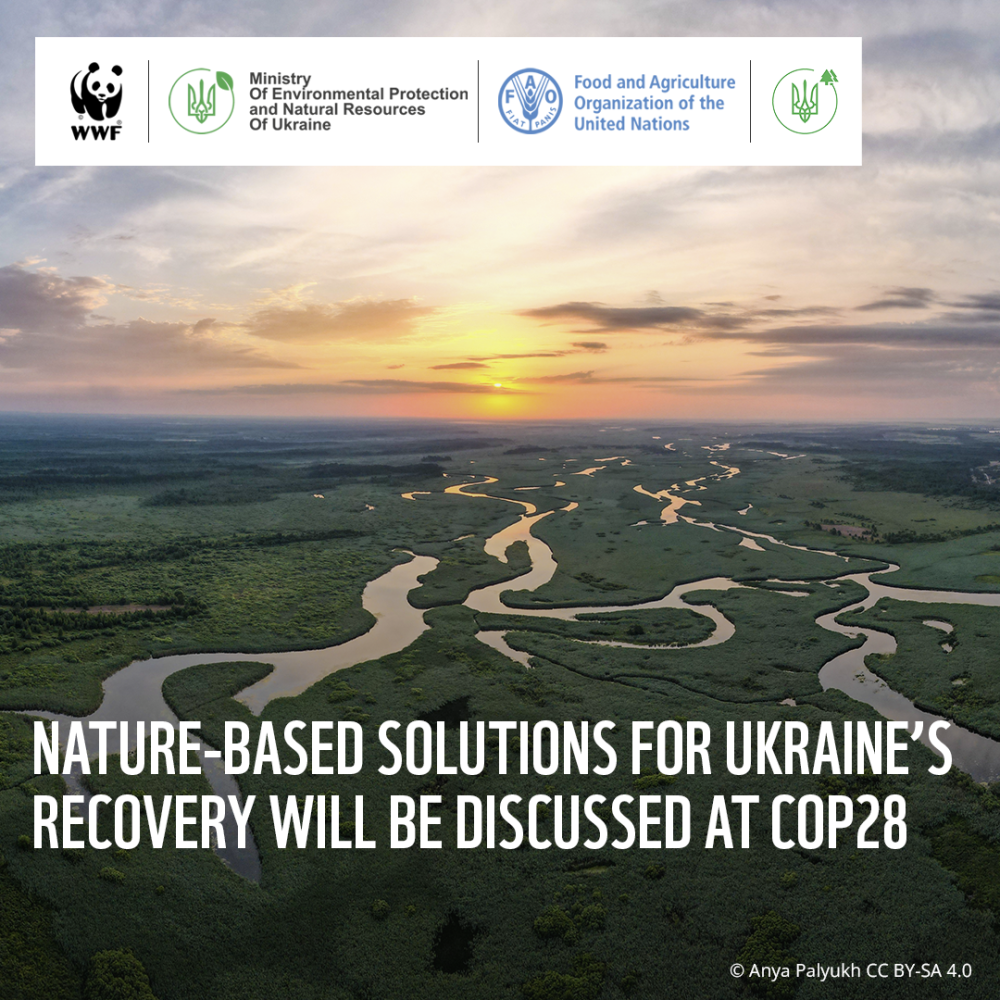“Facing the challenge of climate change demands collective action nature-based solutions not only aid adaptation but also strike a crucial balance between economic, environmental, and social needs. Scaling up sustainable practices in forestry, water, and agriculture, coupled with cross-sectoral collaboration, is the key,” emphasizes Kostiantyn Gura, Conservation Director at WWF-Ukraine.
Five compelling takeaways on the use of nature-based solutions in Ukraine's post-war recovery, unveiled at the COP28 Ukrainian Pavilion:
1. Close-to-nature forestry
The presence of large artificial forests, which, compared to natural ones, are more sensitive to climate change, necessitates the implementation of technologies that enhance their adaptive potential and help preserve a continuous forest cover. Establishing new forests requires strategic changes in the face of climate change. Therefore, nature-based forestry is of significant importance in the implementation of Ukraine's Forest Strategy, currently designed for the period until 2035.
2. Nature-based solutions for water resources management
Water basin management plans, integral to Ukraine's European integration commitments, emerge as vital documents addressing river basin challenges post-war. Tailored solutions for each basin and water body are imperative, and nature-based solutions emerge as the innovative tool required.
3. Restoration of Marshes
Marshes have the ability to sequester carbon, influence the water balance, and contribute to the preservation of biodiversity. Dried-up marshes are fire-prone, so there is a trend in Europe towards their restoration. Paludiculture on restored marshes is a promising nature-based solution for Ukraine, which not only promotes ecological balance but can also be considered as an effective method of agriculture in these areas.
4. Opportunities
A call to arms for effective cross-sectoral cooperation arises as the linchpin for successful nature-based solutions implementation. These solutions promise to bolster society's resilience to climate change, natural disasters, and resource shortages, playing a pivotal role in Ukraine's post-war recovery.
5. A Visionary Future
As an EU candidate country, Ukraine must embrace norms, standards, and commitments, with the new Green Policy spotlighting sustainable resource use. The collective vision hinges on harnessing ecosystems to combat climate change, preserve biodiversity, and foster community development — a shared dream of harmonious coexistence between humanity and the natural world.
On December 10th, distinguished speakers from WWF-Ukraine and WWF International, alongside key figures from the Verkhovna Rada of Ukraine, the State Forest Resources Agency, the State Water Resources Agency, The Food and Agriculture Organization, the Michael Succow Foundation, and UNDP in Ukraine gathered to share their insights on the crucial role of nature-based solutions in Ukraine's reconstruction and the global fight against climate change.
The panel was going to tackle the pressing issue of Ukraine's environmental recovery amid the immediate need for humanitarian aid and economic stability. Despite the urgency of addressing war-induced challenges, the environmental aspect, including its climate component, cannot be overlooked. The devastation caused by warfare — from the destruction of urban areas to the contamination of water bodies and soil — results in economic losses, increased greenhouse gas emissions, and heightened vulnerability to climate change.
Nature-based solutions present a holistic approach to building climate resilience, mitigating the risk of natural disasters, and fostering sustainable socio-economic development. The panel discussion will delve into practical strategies for integrating these solutions into Ukraine's recovery strategy and donor programs.
 The objectives set for discussion include:
The objectives set for discussion include:
- Harmonious Reconstruction with Nature: Shifting the paradigm towards rebuilding Ukraine in synergy with its natural environment.
- Achieving Climate and Sustainable Development Goals: Aligning recovery efforts with international climate and sustainability targets.
- Mitigating War's Impact on Natural Ecosystems: Minimizing the negative consequences of conflict on the environment in the context of climate change.
- Incentivizing Nature-friendly Practices: Creating financial mechanisms to encourage environmentally conscious approaches.
- Supporting Human Capital, Science, and Education: Nurturing the development of Ukrainian expertise in environmental sciences and promoting education for sustainable practices.
- Building a Fair and Inclusive Society: Ensuring that the benefits of recovery are equitably distributed across all segments of the population.
The thematic choice of Ukraine's pavilion, rooted in President Volodymyr Zelenskyy's Peace Formula, underscores the nation's commitment to environmental security. By presenting its pavilion for the second time in history, Ukraine aims not only to showcase the environmental toll of conflict but also to propose solutions that resonate on a global scale.
As the world watches, COP28 stands as a pivotal moment for Ukraine to pioneer a path of recovery that not only rebuilds its infrastructure but also safeguards its natural treasures for generations to come. The discussions on December 10th promise to illuminate a way forward, where nature becomes a catalyst for resilience, sustainability, and a brighter future for Ukraine and the entire planet.
For contact:
Yuliia Novoseltseva, Forest Communicating Officer
E: ynovoseltseva@wwf.ua, T: +38 063 756 62 93
Follow WWF-Ukraine:
Official website https://wwf.ua (WWF-Ukraine)
Facebook facebook.com/wwfukraine (WWF-Україна)
Instagram instagram.com/wwf_ukraine (WWF_Ukraine)
Telegram https://t.me/wwfukraine (@wwfukraine)


